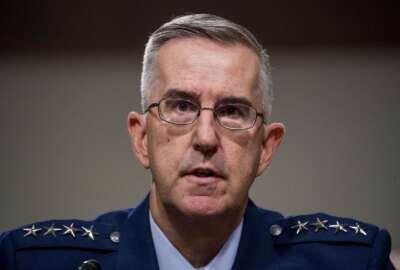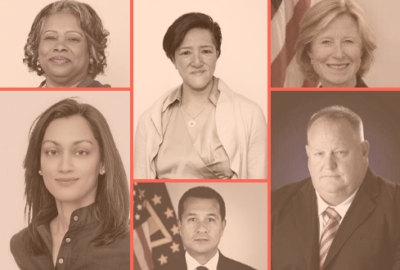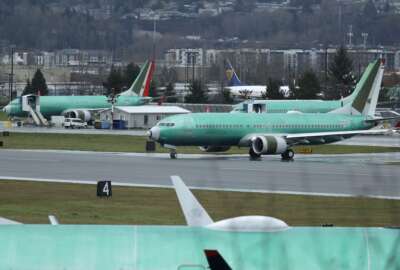
Independent panel finds FAA put Boeing 737 Max through ‘rigorous’ vetting
In today's Federal Newscast, a federally appointed panel finds the Federal Aviation Administration followed its own rules in certifying the troubled airplane.
To listen to the Federal Newscast on your phone or mobile device, subscribe in PodcastOne or Apple Podcasts. The best listening experience on desktop can be found using Chrome, Firefox or Safari.
- An independent panel found the Federal Aviation Administration followed its own rules in certifying the Boeing 737 Max. Appointed by Transportation Secretary Elaine Chou last April, the panel called the FAA’s product certification process rigorous, and overseen by people committed to safety. And it said that the agency followed proper procedures in certifying the troubled plane. But the panel found areas for improvement. It came up with 32 recommendations, including working with NASA to widen use of its safety management system, and developing recruitment and workforce management programs to bolster the agency’s professional ranks. (Department of Transportation)
- Senate confirmations for political appointees in the Trump administration take twice as long as they did 40 years ago. The Partnership for Public Service’s Center for Presidential Transition said the Senate confirmation process took an average of 115 days under President Donald Trump, compared to a 56-day average under President Ronald Reagan. The Partnership said divided government hasn’t necessarily resulted in longer confirmation times. Confirmations with a White House and Senate controlled by the same party take an average of 83 days, compared to 81 days when controlled by different political parties.
- The Office of Federal Procurement Policy is proposing a way to measure delays in releasing solicitations or making awards. OFPP today defined procurement administrative lead time or PALT, as required by the 2019 National Defense Authorization Act. In that definition, OFPP said PALT is “the time between the date on which an initial solicitation for a contract or order is issued by a federal department or agency and the date of the award of the contract or order.” The administration seeks feedback on both the definition as well as the approach to measuring the lead times. Comments are due by mid-February. (Federal Register)
- Another vendor is unhappy with the General Services Administration’s approach to the e-commerce marketplace. And this vendor protest may force a much bigger delay and more changes. Overstock.com filed a complaint with the Government Accountability Office on Jan. 15, challenging the terms of the solicitation and arguing it imposes unreasonable requirements that restrict competition. GSA also faced an agency-level protest in November by Amazon, which also challenged the RFP’s requirements. GSA took corrective action for bidders in mid-January. With this latest protest, GAO has until April 24 to decide. (Government Accountability Office)
- Less than a year after joining forces, the federal Robotic Process Automation Community of Practice has released a playbook for future implementation. The document offers advice for agencies just getting started with RPA, like building a strong partnership between program offices and chief information officers. Current agency RPA programs have eliminated about five hours of workload per employee. If these programs scaled up to cover 20 hours of workload per employee, the federal government would save more than $3 billion a year.
- Amid the search for a permanent chief data officer at the Department of Health and Human Services, the agency has lost a data official. Mona Siddiqui, the CDO of the agency’s Office of the Chief Technology Officer, stepped down after three years on the job. During her tenure, HHS saw greater enterprisewide data sharing, and launched a data science and artificial intelligence training program. HHS Chief Information Officer Jose Arrieta expects to serve as acting CDO for the agency until a permanent pick has been named. (Department of Health and Human Services)
- The Merit Systems Protection Board weighed in on several Trump administration workforce initiatives. It sees promise with an Office of Personnel Management-U.S. Digital Service pilot designed to bring more subject matter experts into the hiring process. They’ll help human resources specialists evaluate and choose the most qualified candidates. MSPB also said it’s concerned recent graduates of the administration’s Federal Cybersecurity Reskilling Academy don’t have more options to use their new skills in actual cyber positions. It said the administration won’t achieve the full potential of its reskilling programs unless it finds a workaround to the General Schedule and its barriers. (Merit Systems Protection Board)
- The new vice chairman of the Joint Chiefs of Staff is putting a new focus on military personnel issues. Gen. John Hyten said he’s appointing a new special assistant — effective Tuesday, Jan. 21 — to work on military’s people and family programs. He said in too many cases, the department has failed to meet its commitments to take care of service members. He specifically cited the ongoing housing crisis and persistently high rates of suicide and sexual assault. Hyten said he wants the new office to start addressing structural and cultural issues that have seemed to make those problems so intractable in the military services.
- Starting Jan. 22 military service members will be able to receive free tax preparation services for the upcoming tax season. Military OneSource offers the MilTax program to help service members. It offers electronic filing using do-it-yourself software and personalized support from a tax consultant. The program is open to active duty, their families, National Guard members, reservists, survivors and veterans who have left the military in the last year.
- There are new restrictions to foreign military students after an attack on a Florida military base by a Saudi student in December. Students will no longer be allowed to bring privately owned firearms onto military bases. The Pentagon will be looking more closely at the comings and goings of students as well. Local commanders will also be authorized to put extra limitations on students and put restrictions on how far they can travel from base. There are currently about 5,200 foreign military students from 153 countries training in the U.S. (Federal News Network)
Copyright © 2024 Federal News Network. All rights reserved. This website is not intended for users located within the European Economic Area.
Eric White
Eric White is news anchor and Federal Drive producer at Federal News Network.
Follow @FEDERALNEWSCAST
Related Stories

IT executive retirements hit USDA, Commerce while HHS, GSA lose key personnel
Related Topics
Agency Oversight
All News
bid protest
Boeing 737 Max
Cyber reskilling academy
Federal Aviation Administration
Federal Drive
Federal Newscast
General Services Administration
Government Accountability Office
John Hyten
Joint Chiefs of Staff
Management
Merit Systems Protection Board
MilTax
Naval Air Station Pensacola Shooting
Office of Federal Procurement Policy
Pentagon sexual assault task force
political appointees
robotic process automation
Senate confirmation hearings
Technology
veteran suicide
Workforce




